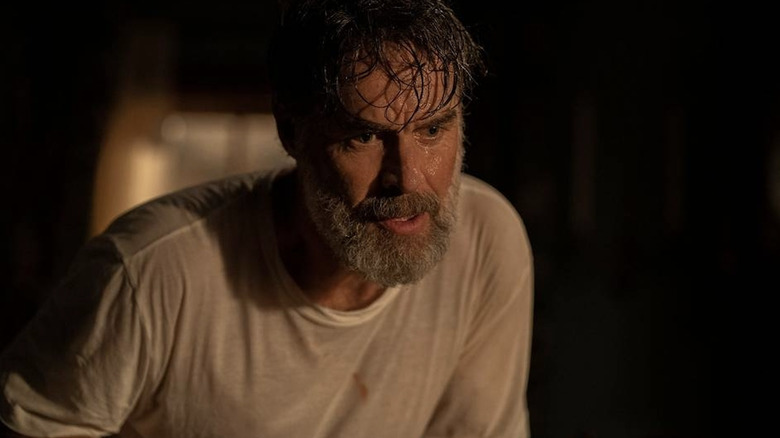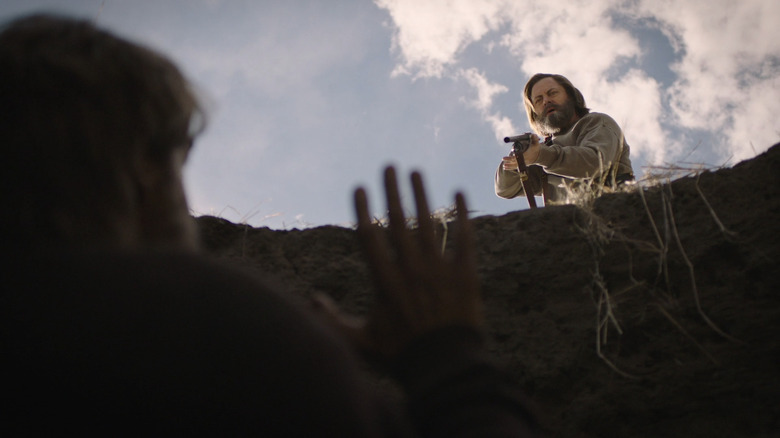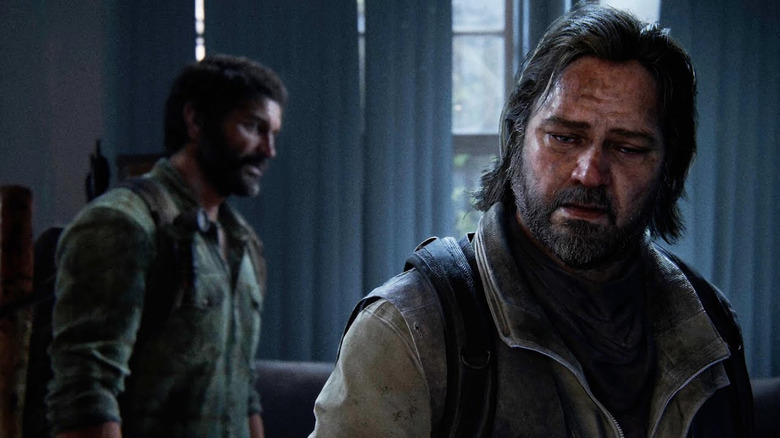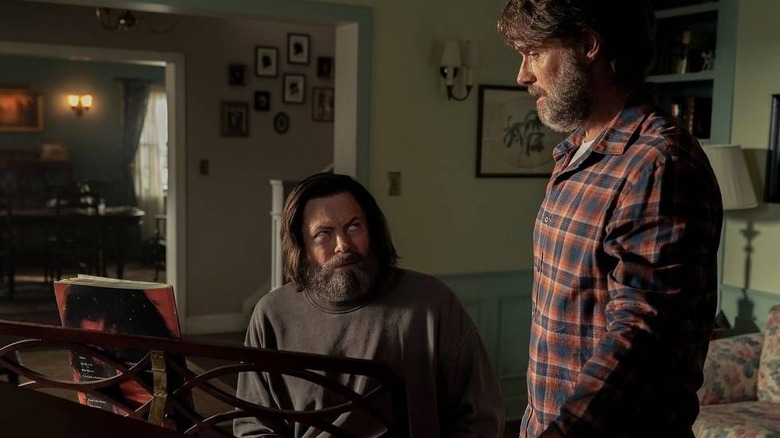The Saddest Episode Of HBO's The Last Of Us Has A Happier Ending Than The Game
This post contains spoilers for the first three episodes of "The Last of Us."
When it comes to "The Last of Us," tears have always been a given. It's a post-apocalyptic show about a world torn apart by a brain-controlling fungus and the entire first episode is dedicated to Joel's (Pedro Pascal) ridiculously tragic backstory (aka that time his teen daughter literally died in his arms). It's an apocalypse world — tragedy is the price of admission! And it's not that I thought being familiar with the game would make me immune to the sadness; I just hoped it would give me an advantage. At the very least, I should know when to reach for the box of Kleenex, right? Wrong.
Neil Druckmann and Craig Mazin's HBO adaptation is full of surprises, and the latest comes in the form of Bill (Nick Offerman) and Frank (Murray Bartlett), a survivalist duo who we both meet and lose in the third episode of the series. This is where things get complicated: even though I cried much more than expected when these two characters appeared, their story ends on a happier note than it does in the original game.
I can see how that's a little hard to believe, given that the episode ends with the couple dead in their bedroom, but remember that happiness is relative in this zombie-ridden universe. Watching their story play out in the series may have collectively shattered the audience's hearts, but at least there was something so real and worthy of our affection, that we could be devastated by its loss. In the game, Bill and Frank's relationship is much bleaker.
Frank meets a bitter end in the game
First off, the details of Bill and Frank's relationship are much more peripheral in Naughty Dog's "The Last of Us." They never even interact onscreen and the romance is only implied through Joel's conversations with Bill. When Ellie and Joel make it to the town, Bill is still alive but flying solo. Players get to spend time with him — gathering supplies and killing infected — as the crew searches for a working car in Bill's town. Along the way, he reveals that he once had a partner who abandoned him. Eventually, Joel and co. will stumble upon a house and discover that Bill's former partner met a bleak end: after making his way across town, Frank hung himself. Scoping out the area will lead to finding Frank's suicide note, declaring his hatred for Bill.
Frank, it turns out, was trying to get away from Bill and their life in his closed-off town. On his way out, a horde of infected got too close and Frank was bitten. Before his brain could succumb to the cordyceps infection, he decided to take his own life. His parting words to Bill? Well, let's just say they were far from warm. His letter reads:
"Well, Bill, I doubt you'd ever find this note cause you were too scared to ever make it to this part of town. But if for some reason you did, I want you to know I hated your guts. I grew tired of this sh***y town and your set-in-your-ways attitude. I wanted more from life than this and you could never get that. And that stupid battery you kept moaning about — I got it. But I guess you were right. Trying to leave this town will kill me. Still better than spending another day with you. Good Luck, Frank."
'Once upon a time, I had somebody that I cared about'
So, is "Long Long Time" really sad? Absolutely. But Bill and Frank loving each other enough to stay together even in death is a much happier story than Frank running off, getting infected, committing suicide, and leaving an I-Hate-You note behind. More importantly, this change to their story becomes a beautiful runway for Joel's journey with Ellie to continue. As /Film's Valerie Ettenhofer wrote in her review, "The chapter re-imagines a subplot of the original game entirely, and the result is a crushingly beautiful standalone story that doubles as a pure embodiment of the game's most poignant themes."
For game-Joel, seeing the end of Frank and Bill's relationship essentially reaffirms what he already believes: there's no point in caring for anyone in this crumbling world. Isn't that what he learned from the loss of Sara? And sure enough, Bill makes sure to communicate his stance on the matter. "Once upon a time, I had somebody that I cared about," Bill tells Joel in the game. "It was a partner. Somebody I had to look after. And in this world, that sort of s***'s good for one thing: gettin' you killed."
I for one am awestruck by the cleverness of this adaptation. Instead of turning Bill and Frank into a cautionary tale of what not to do, they become a model for exactly what Joel is failing to understand about the world.
Joel could learn a lot from Bill
Joel refuses to forge connections with the potential to shatter him: despite his partnership with Tess, he kept her at arm's length. As for Ellie? He refuses to see her as anything more than some walking-talking cargo. He doesn't want to be attached to anyone, and certainly not a snarky little girl who reminds him of his past.
So the show makes Bill into a cautionary tale of another kind. After all, he's been where Joel is right now: he kept himself protected, well-fed, and emotionally unattached. But in the end, none of that matches up to the life he has once he lets Frank into his bubble. Sure they bicker, unable to agree on some details of their life in the town. And yes, caring comes at a terrifying cost — suddenly, there's something besides himself that requires protection. But that companionship and love is so much greater than a safe life of solitude. So much so that when Frank decides to end things, Bill can't imagine going back to how things were.
"I used to hate the world and I was happy when everyone died. But I was wrong," Bill tells Joel in his note, doing his best to impart his hard-won wisdom. "Because there was one person worth saving." If Joel is willing to open himself up to loving someone like that then yes, it might just end in sorrow, like the calamity of Bill and Frank dying in each other's arms. But according to Bill, that sure beats a life of bitter solitude.



